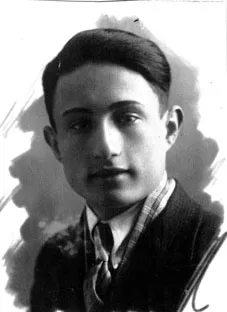Sholom Rondin
I, Rondin Sholom. Photo made in Gomel in 1934 and given to my girlfriend - my future wife. I made my own living by that time.
Gomel was a bigger town. There were 4 Jewish schools in it. When I turned 7 in 1927 my family asked me "Do you want to go to a Russian, Buelorussian or Jewish school?" I decided to go to the Jewish school. We spoke Yiddish at home and I decided it was natural for me to go to the Jewish school. I communicated with various children. Most of them were Jewish, but some were Russian. I had no problems and got along well with all of them.
The school I went to was very good. The teachers were wonderful. We studied mathematic in Yiddish, reading and writing in Yiddish and Russian. All subjects were taught in Yiddish, but the program of studies was similar to any other school and we were raised like any other Soviet children. There were about 30 children in our class. I remember Rasha Kapran, a young teacher of the history of the Jewish people. I also remember our teacher of drawing; I was very good at drawing. I learned the history of the Jewish people - I read in Yiddish how difficult their life was and how hard and trying times they had. I got free lunches at school. They were good kosher meals. I was a quiet boy and didn't take an active part in public life.
Life was good in the Soviet Union. There were pioneer camps where children could spend their vacations free of charge. One of the camps was in about 12 km from Gomel. There were children from various schools. We got ordinary meals (non-kosher), but I liked it there a lot. We had an interesting life.
At school I tried to be a good pioneer. We collected waste paper and scrap, cleaned up the area around school, competed in our successes at school and dedicated it all to the building of communism and our chief - comrade Stalin in person. Meanwhile I went to the synagogue with my grandfather. I don't remember that pioneers were not allowed to go to synagogue. There were many Jews in the town and there was no tension associated with the issues of nationality. People spoke Yiddish in the streets with no feeling awkward. My grandmother and grandfather observed all Jewish traditions: they lit candles on Shabbat, celebrated all holidays and followed the kashrut. They only had kosher food. Of course, I didn't believe that God existed. I thought their faith was vestige of the ignorant past, but I respected their age and traditions.
1933 famine was the same for us as for all other people. We sold our cow, because we had nothing to feed it with, we sold our silver dishes, but we still didn't have enough to eat. My father's brother Motl supported us and shared what he earned with us.












